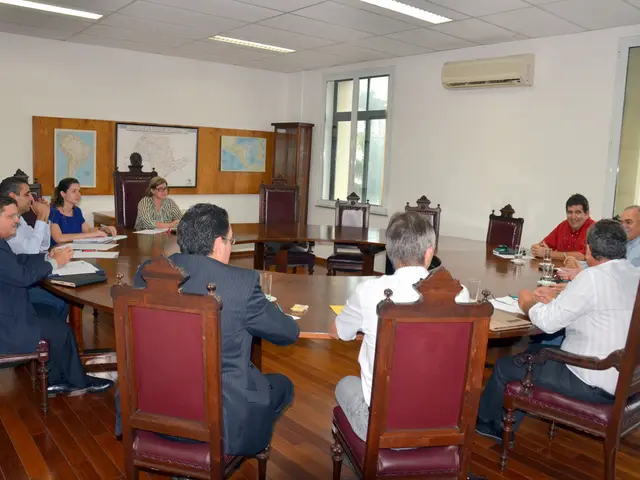A Judge Halts Trump's Ban on Foreign Students at Harvard University
Foreign student enrollment Ban at Harvard momentarily lifted by Judge's Decision
In a surprising turn of events, Judge Allison Burroughs from Massachusetts has temporarily halted the entry ban on foreign students accepted by Harvard University, a decision that was announced by President Donald Trump earlier this week.
Harvard University, based in Massachusetts, accused the White House of pushing an unjustified and vindictive campaign against the institution. They alleged that the ban was part of this pressure tactic, aimed at forcing the university to submit to audits of its academic programs, staff, and students, in exchange for maintaining federal funding.
Judge Burroughs' ruling suggests that Harvard faces immediate and irreparable harm, before all parties have had the opportunity to be heard. In her paperwork, she highlighted that the institution is at risk of suffering significant damage, owing to the ban on new international students.
Earlier this week, Donald Trump had signed an executive order that suspended the entry of new international students accepted by Harvard for six months. The president had accused the university of radicalism and concerning foreign ties.
Harvard's Battle Against the Trump Administration
Harvard, a renowned global university, hosts over 10,158 international students from 150 countries, including 2,126 from China, during the 2024/2025 academic year[1]. The university has been at the forefront of Trump's ongoing battle against higher education. It has refused, among other things, to submit to audits of its academic programs, staff, or students in exchange for maintaining federal funding[2].
The Trump administration has already cut approximately three billion dollars (2.62 billion euros) in funding to the university, and, in May, attempted to revoke Harvard's SEVIS (Student and Exchange Visitor) certification[2]. Like the former attempt, this measure was also suspended by Judge Burroughs, who emphasized the need to ensure certain protections for the university's international students[2].
International Tension
China criticized the restrictions imposed by Donald Trump on the entry of foreigners, including those affecting Harvard. Spokesman Lin Jian, from the Ministry of Foreign Affairs, stated that educational cooperation between China and the US is mutually beneficial and that China has always opposed politicization in this area[3].
The spokesman also expressed regret over the new ban on traveling to the United States for citizens of 12 countries, including Iran, Haiti, Equatorial Guinea, Somalia, and Yemen[3]. The restrictions imposed on citizens from another seven countries, such as Cuba and Venezuela, were also criticized.
The Republican executive orders have been justified by the White House in the name of "national security," but they have sparked criticism both in the US and abroad for their impact on academic mobility and access to higher education[3]. These orders could potentially set a precedent for other universities facing similar challenges, impacting the overall landscape of international student enrollment in the US.
Enrichment Data:
Background of the Lawsuit
Harvard University has filed a lawsuit against the Trump administration in response to a ban on international students, following the Department of Homeland Security's (DHS) revocation of Harvard's certification to sponsor F-1 and J-1 visas for foreign students[4]. This move came as a result of Harvard's refusal to turn over records of foreign students[1][4]. A presidential proclamation soon followed, barring international students from entering the U.S. to study at Harvard, effectively preventing new students from joining and forcing existing ones to transfer or lose their legal status[3].
Key Issues in the Lawsuit
- Legal Basis: Harvard argues that both the DHS action and the presidential proclamation are unlawful, violating the university's rights and causing significant disruption to its academic programs[2][3].
- First Amendment Concerns: Harvard claims that the actions by the Trump administration are retaliatory and infringe upon the university's First Amendment rights, particularly in relation to allegations of campus antisemitism and diversity policies[3].
- Impact on International Students: More than 10,000 international students and scholars are affected by these actions, with many admitted students unable to join for the upcoming semester[3].
Impact on Academic Mobility
The ban has severe implications for academic mobility, both for Harvard and the broader U.S. higher education system:
- Disruption of Academic Programs: The absence of international students disrupts academic programs, research, and the educational experience for all students, as Harvard's international students are integral to its academic environment[2].
- Global Reputation: The ban may damage the reputation of U.S. universities as welcoming places for international students, potentially deterring future applicants and affecting the global competitiveness of U.S. higher education[3].
- Legal Challenges: The ongoing legal battle could set a precedent for other universities facing similar challenges, impacting the overall landscape of international student enrollment in the U.S.[3].
- The ongoing battle between Harvard University and the Trump administration highlights the intersection of migration, policy-and-legislation, and politics, as the university's refusal to comply with audits led to a ban on foreign students, sparking a lawsuit.
- The Trump administration's actions against Harvard and other universities, such as the revocation of SEVIS certification and the executive order banning foreign students, have been met with criticism due to war-and-conflicts-related restrictions and the potential impact on academic mobility.
- International tension escalated as a result of the Trump administration's travel restrictions, with countries like China expressing concerns over the impact on educational cooperation and general-news outlets covering the unfolding legal battle between Harvard and the Trump administration.








